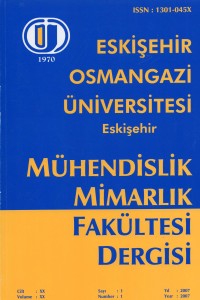Forecastıng Method Selectıon For Capacıty Plannıng In Servıce Systems
Öz
Anahtar Kelimeler
Kaynakça
- [1] A.S. Anagun, “Selecting inventory models using an expert system.”, Computers and Industrial Engineering, Vol.33, No.1-2, pp.299-302, 1997.
- [2] R.R. Weitz, “NOSTRADAMUS: A knowledge based forecasting advisor”, International Journal of Forecasting, Vol.2, pp.273-283, 1986.
- [3] K.K. Kwong, D. Cheng, “A prototype microcomputer forecasting expert system.”, Journal of Business Forecasting, Vol.7, pp.21-27, 1988.
- [4] O.B. Arinze, S. Kim, M. Anandarajan, “Combining and selecting forecasting models using rule based induction.”, Computers and Operations Research, Vol.24, No.5, pp.423-433, 1997.
- [5] T. Lo, “An expert system for choosing demand forecasting techniques”, International Journal of Production Economics, Vol.33, No.1-3, pp.5-15, 1994.
- [6] O.B. Arinze, “Selecting appropriate forecasting models using rule induction.”, Omega. The International Journal of Management Science, Vol.22, pp.647-658, 1994.
- [7] M.S. Kandil, S.M. El-Debeiky, N.E. Hasanien, “Overview and comparison of long-term forecasting techniques for a fast developing utility: part I” Electric Power System Research, Volume 58, No.1, pp.11-17, 2001.
- [8] M.S. Kandil, S.M. El-Debeiky, N.E. Hasanien, “The implementation of longterm forecasting strategies using a knowledge-based expert systems: part II” Electric Power System Research, Volume 58, No.1, pp.19-25, 2001.
- [9] R. B. Chase, N. J. Aquilano, “Production and Operations Management”, 7th edition, IRWIN: Chicago, 1995.
- [10] D. M. Georgoff, R. G. Murdick, “Manager’s guide to forecasting.”, Harward Business Review, Vol. Jan-Feb, pp.110-120, 1986.
- [11] J.C. Chambers, S.K. Mullick, D.D. Smith,. “How to choose the right forecasting techniques.”, Harward Business Review, Vol.49, No.4, pp.45-74, 1971.
- [12] R.G. Murdick, B. Render, R.S. Russell, “Service Operations Management.”, Allyn and Bacon:USA, 1990.
- [13] J.H. Wilson, B. Keating, “Business Forecasting”, 2nd edition, IRWIN:USA, 1994.
- [14] I. Bratko, “Prolog: Programming for Artificial Intelligence.”, Addison Wesley: USA, 1990.
Forecastıng Method Selectıon For Capacıty Plannıng In Servıce Systems
Öz
Although service firms tend to estimate the number of customers in a sensitive manner, the structure of the service is changeable on a large scale. Under these circumstances, choosing the most suitable forecasting method is a quite important decision. In this paper, a rule-based Expert Forecasting Method Selector (EFMS) was built by using PROLOG to capture the skill and aimed to act as an advisor for choosing appropriate method. EFMS was designed based on specific criteria to cover both qualitative and quantitative methods that may be applied to service systems. The EFMS also provides users fundamental info about forecasting methods and a chance of making calculation related to the selected method.
Anahtar Kelimeler
Expert Systems Forecasting Methods PROLOG Service Systems. .
Kaynakça
- [1] A.S. Anagun, “Selecting inventory models using an expert system.”, Computers and Industrial Engineering, Vol.33, No.1-2, pp.299-302, 1997.
- [2] R.R. Weitz, “NOSTRADAMUS: A knowledge based forecasting advisor”, International Journal of Forecasting, Vol.2, pp.273-283, 1986.
- [3] K.K. Kwong, D. Cheng, “A prototype microcomputer forecasting expert system.”, Journal of Business Forecasting, Vol.7, pp.21-27, 1988.
- [4] O.B. Arinze, S. Kim, M. Anandarajan, “Combining and selecting forecasting models using rule based induction.”, Computers and Operations Research, Vol.24, No.5, pp.423-433, 1997.
- [5] T. Lo, “An expert system for choosing demand forecasting techniques”, International Journal of Production Economics, Vol.33, No.1-3, pp.5-15, 1994.
- [6] O.B. Arinze, “Selecting appropriate forecasting models using rule induction.”, Omega. The International Journal of Management Science, Vol.22, pp.647-658, 1994.
- [7] M.S. Kandil, S.M. El-Debeiky, N.E. Hasanien, “Overview and comparison of long-term forecasting techniques for a fast developing utility: part I” Electric Power System Research, Volume 58, No.1, pp.11-17, 2001.
- [8] M.S. Kandil, S.M. El-Debeiky, N.E. Hasanien, “The implementation of longterm forecasting strategies using a knowledge-based expert systems: part II” Electric Power System Research, Volume 58, No.1, pp.19-25, 2001.
- [9] R. B. Chase, N. J. Aquilano, “Production and Operations Management”, 7th edition, IRWIN: Chicago, 1995.
- [10] D. M. Georgoff, R. G. Murdick, “Manager’s guide to forecasting.”, Harward Business Review, Vol. Jan-Feb, pp.110-120, 1986.
- [11] J.C. Chambers, S.K. Mullick, D.D. Smith,. “How to choose the right forecasting techniques.”, Harward Business Review, Vol.49, No.4, pp.45-74, 1971.
- [12] R.G. Murdick, B. Render, R.S. Russell, “Service Operations Management.”, Allyn and Bacon:USA, 1990.
- [13] J.H. Wilson, B. Keating, “Business Forecasting”, 2nd edition, IRWIN:USA, 1994.
- [14] I. Bratko, “Prolog: Programming for Artificial Intelligence.”, Addison Wesley: USA, 1990.
Ayrıntılar
| Konular | Endüstri Mühendisliği |
|---|---|
| Bölüm | Araştırma Makaleleri |
| Yazarlar | |
| Yayımlanma Tarihi | 30 Haziran 2007 |
| Yayımlandığı Sayı | Yıl 2007 Cilt: 20 Sayı: 1 |

